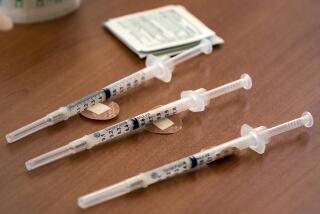Moderna’s vaccine results boosted its share offering — and it’s hardly a coincidence
- Share via
The announcement Monday by Moderna Inc. of preliminary — very preliminary — results from its trial of a possible COVID-19 vaccine seemed at the time to reflect a global thirst for any potentially positive news in the fight against the pandemic.
On Tuesday, it looks rather different. That’s because on the heels of the vaccine announcement, the Cambridge, Mass., biotech firm announced the sale of 17.6 million new shares at a price of $76 each.
That would have been a premium of nearly 14% over the $66.69 price of Moderna stock on Friday. But it’s a 5% discount to the stock’s price at Monday’s closing.
The totality of the science tells us that this is the right approach.
— Tal Zaks, Moderna
At this valuation, in other words, the shares might have looked overpriced as of Friday. On Tuesday, following a huge burst of positive publicity, they almost look like a bargain.
The shares closed at $71.67 in Nasdaq trading Tuesday, reflecting the coming inflow of 17.6 million more shares as well as some of the air leaking out of the vaccine balloon. The offering is expected to close this week.
We’ve asked Moderna if there was any connection between its decision to release results from its vaccine trial and the timing of its share offering announcement, but haven’t yet received a response.
The company announced the vaccine results at about 8:30 a.m. New York time Monday, its stock offering at 4:18 p.m. (18 minutes after the stock market closed) and the offering price at 10:32 p.m.
Let’s be clear about the proper question to ask about this chronology. It’s not exactly about Moderna’s decision to announce a share offering on the day its stock price rose by nearly 20%.
That arguably reflects the time-worn principle of striking while the iron is hot. One-day increases of 20% have a tendency to fade over time, especially if they’re based on an announcement of a product that may not prove out in the long run.
The stock market is euphoric over news of a possible coronavirus vaccine. But for now, you shouldn’t be.
Moderna says the share offering will raise $1.37 billion, which it will use for “manufacturing the vaccine ahead of a potential approval and launch.” It’s anticipating approval by the Food and Drug Administration as early as sometime this year.
The more pertinent question may be why Moderna chose to release results from its vaccine trial Monday. It’s especially pertinent because the announced results were arguably premature.
As we reported, Monday’s announcement covered results of a preliminary Phase 1 trial of the vaccine, based on only eight human subjects.
The main goal of the trial was to determine if the vaccine made the subjects seriously ill. For these eight, it didn’t; that’s good news. The trial also indicated that the vaccine produced antibodies in those subjects that are potentially active against the virus causing COVID-19.
But the eight subjects don’t even represent the full cohort enrolled in the Phase 1 trial. Through the National Institutes of Health, Moderna initially enrolled 45 subjects aged 18-55. Full results for the 37 subjects other than the first eight haven’t been disclosed.
The U.S. is suffering shutdown fatigue because the COVID-19 war has stagnated.
Whether the positive showing from the first eight subjects justified Monday’s euphoria is a topic for stock market analysts, not scientists. The path to full development of Moderna’s candidate vaccine will be long, difficult and expensive.
Encouraging as the preliminary results may be, the vaccine will have to be subjected to at least two more trial phases involving tens of thousands of enrolled subjects before the FDA deems it safe and effective.
It’s not at all unusual for drugs that pass the undemanding standards of Phase 1 trials to fail in the final analysis. In this case, the Phase 1 results don’t tell us anything about whether Moderna’s vaccine will work against the virus once it’s administered to humans.
The stock market reaction, however, seems to reflect an assumption that the vaccine is a done deal, as if the only obstacle to a full-scale global rollout is FDA approval.
There’s also a question of whether Moderna could reap huge profits from the vaccine even if it is ultimately approved, since vaccine manufacturers will be under tremendous pressure to keep the price low enough to allow universal access.
Other drug makers, including the giant Johnson & Johnson, also are researching COVID-19 vaccines, which could compete with anything Moderna brings out.
Despite all that, Moderna launched a full-scale publicity campaign Monday for its proposed vaccine, and many in the press and in the trading markets took it at face value.
The America that condones mass murder of children is allowing the coronavirus to spread.
Tal Zaks, the firm’s chief medical officer, told Wall Street analysts in a conference call that there’s no longer any reason to fear that Moderna’s vaccine research is on the wrong track. The main risk, he said, was in the logistics in mounting a large randomized trial that suited customary regulatory standards. “The totality of the science tells us that this is the right approach,” he said.
Moderna is worth watching, but not only for good reasons. The company may have an “in” with the Trump administration, which just appointed its former board member Moncef Slaoui to head the White House vaccine czardom. Slaoui has reported holding $10 million in Moderna stock options, a potential conflict of interest, though the company says he will divest the options.
Moderna also has received a commitment of up to $483 million from BARDA, the Biomedical Advanced Research and Development Authority of the Department of Health and Human Services, to fund its vaccine program.
It would be cause for concern if an inside connection produces an early FDA approval of Moderna’s vaccine despite a lack of firm evidence that it’s safe and effective.
The company already has set the foundations for overpromising by heavily promoting trial results from only eight subjects. Further premature releases of trial data, coupled with more financial maneuvering, wouldn’t be good for anyone.
More to Read
Inside the business of entertainment
The Wide Shot brings you news, analysis and insights on everything from streaming wars to production — and what it all means for the future.
You may occasionally receive promotional content from the Los Angeles Times.













